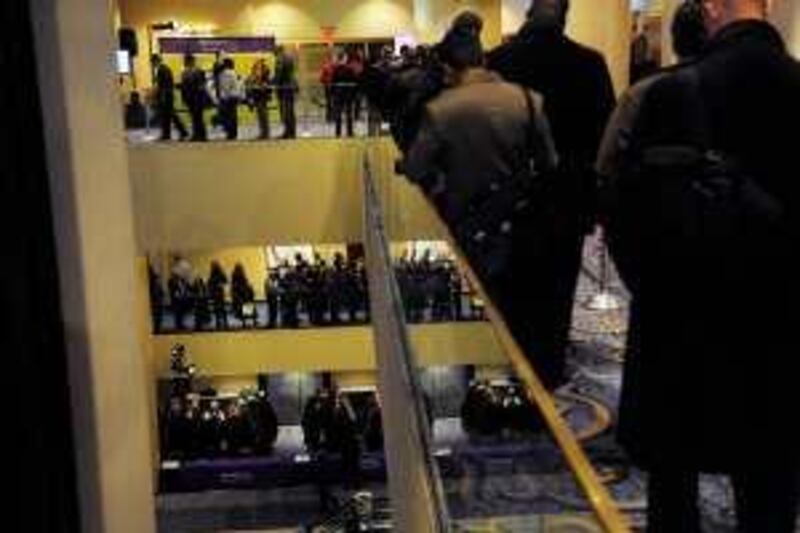New York // Sambit Singh was one of about 3,500 people who patiently queued at a jobs fair last week in a line that snaked outside the Marriott Marquis Hotel on Manhattan's Times Square. Unemployed for six months, the former IT manager at the JP Morgan Chase investment bank hoped to generate at least one interview at the fair, organised by www.monster.com, a jobs website. About 1,000 positions were on offer from 92 employers at the event. "Luckily, my wife has a job," said the 37-year-old from India who has two children. "I can't go back to India because IT has stalled there because of the US recession." The men and women of all races who waited in the cold were dressed smartly in business suits and carrying briefcases, a striking contrast with the traditional image of unemployed hopefuls familiar from photographs of mostly manual workers seeking jobs during the Great Depression of the 1930s. A further 651,000 jobs disappeared last month, bringing the unemployment rate to 8.1 per cent, the highest since 1983, the government reported on Friday. The economy has lost 4.4 million jobs since the decline began in December 2007, more than half of them in the past four months. Unofficial numbers, including "discouraged workers" or those who have given up looking for jobs and those who have to work part time because employers have reduced their hours, bring the jobless level to 14.8 per cent. Economists at the investment bank Goldman Sachs expect the official level to rise to 9.5 per cent by the end of this year and 10 per cent by the end of next year, echoing the gut-feelings of many Americans. "The economy is going to get worse before it gets better," said Chris Leopizzi, a day trader who has taken such a financial beating over the past five months that he decided to look for full-time work at the jobs fair. "This is hitting all of us. Some of my friends have MBAs; they live in the city and pay around US$3,000 [Dh11,000] a month in rent and they're hurting," said Mr Leopizzi, 30, adding that he was grateful not to be married and to have no dependants. Analysts believe many of the jobs lost in recent months have gone for ever, particularly those in the car industry as well as in the financial services sector that used to give New York a comfortable cushion of wealth. Financial services lost 44,000 jobs in February, including highly paid positions for the very traders and analysts who dealt in the credit default swaps and other exotic instruments that many blame for causing today's failure of financial confidence. At the jobs fair, one of the employers looking for staff was Wachovia, which was acquired by Wells Fargo, another bank, a few months ago. It was looking for financial specialists and tellers willing to work for $26,000 a year, said Estelle Spiegel, a recruitment consultant for the bank. "Lots of people are surprised that we're still looking for people, but we've had no layoffs," she said. "The Wells Fargo acquisition is looking to turn out nicely for us." Many of the jobs on offer at the fair were in sales and dependent on commission. The US Border Patrol was offering full-time jobs with starting salaries of $40,000, but the first two years had to be spent in the south-western United States, a prospect unlikely to be attractive to many New Yorkers. Nonetheless, border patrol jobs could be described as a "growth" sector, given recent drugs-related violence that has spilled across from Mexico into the southern states. Among the careers advice offered in monster.com leaflets was to concentrate job searches in "growth industries", consider taking temporary positions and to stay in touch with former colleagues who might hear about jobs. The Obama administration has made the economy its first priority, announcing a package worth almost $800 billion in spending and tax cuts and a $75bn plan to help an estimated nine million homeowners avoid repossession. President Barack Obama said critics of deficit spending were on the wrong side of history and opposed "the very notion that government has a role in ending the cycle of job loss at the heart of this recession". All the same, he is under attack from some economists who say his plans have done little so far to address the toxic loans that continue to clog the arteries of the financial system. The US treasury is still working on plans for a public-private entity to buy these "assets", but it could be several weeks before any announcement. "The reality is that when it comes to dealing with the banks, the Obama administration is dithering," wrote Paul Krugman, a Nobel Prize-winning economist and columnist for The New York Times. Meanwhile, ordinary people in America continue to tighten their belts and cope as best they can. "I'm hopeful. I got lots of interesting leads here," said Al Mullins, a 46-year-old former vending machine salesman, as he left the jobs fair. "Maybe something good will come." sdevi@thenational.ae Hard Times is an occasional series exploring the ways people around the world cope with the financial crisis.
Briefcases replace flat caps in job queues
With 651,000 people made redundant last month, employment fairs in the US have never been more popular - or more disappointing.

Editor's picks
More from the national





